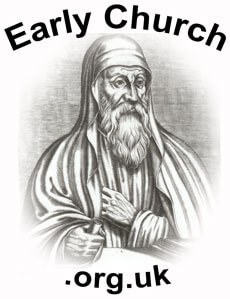Methodius
(d. 311)
Theology on the Web helps over 2.5 million people every year to find high quality theological resources that will help to equip them to serve God and to know Him better (2 Timothy 2:15). Like other websites that provide free services, it is dependent on donations to enable it to grow and develop and only 0.004% of visitors currently do so. If you would like to support this site, please use one of the options to the right of this message.
Synopsis
Virtually nothing is known about the life of Methodius. He is referred to on numerous occasions by later writers, but the accuracy of what they wrote is doubted by modern scholars.[1] What we do know about him has been deduced from studying his extant writings, only one of which is complete in Greek: The Symposium (also known as the Banquet of the Ten Virgins or a Treatise on Chastity). The rest survive only in Slavonic translations. A commentary on Genesis and On Creation are among the list of lost works.[2] The Symposium was a manual of Christian doctrine styled as an imitation of one of Plato’s dialogues.[3] It had a great influence on ascetic thought both in both the eastern and western church,[4] but for our present purposes it is interesting because Methodius used the Genesis account several times in the course of his argument. His exegesis was similar to that of Origen, whose teachings he nevertheless fiercely opposed.[5] He believed that the literal meaning was important,[6] but moved swiftly on to expound the ‘deeper’ typological and allegorical meanings hidden beneath the surface.[7]
Rob Bradshaw, Webmaster
References
[1] Forster & Marston, 206.
[2] "Methodius," F.L. Cross & E.A. Livingstone, editors. The Oxford Dictionary of the Christian Church, 3rd edn. (Oxford: OUP, 1997), 910.
[3] Frederick W. Norris, "Methodius," Everett Ferguson, editor, Encylopedia of Early Christianity. (New York: Garland, 1990),, 595.
[4] Herbert Musurillo, trans. St. Methodius: The Symposium, A Treatise on Chastity. (Westminster, Maryland: The Newman Press / London: Longmans, Green & Co., 1958), 11: "It is clear that in the course of the eleven great discourses with prelude, interludes and epilogue, Methodius is not only discussing the place of celibacy in the Christian scheme of life; he is also giving practical instruction, for example, on the allegorical interpretation of Scripture (e.g., on the numerological and ‘botanical’ methods of exegesis), on the nature of the Millennium and the hereafter, on the divinity of Christ, on the fallacy of astrology, on the freedom of the will, on the meaning of world history, on prayer, and on the method of combating temptations."
[5] Musurillo, 3.
[6] "Methodius," ODCC, 910. This opposition probably explains why the church historian Eusebius, a fan of Origen, ignored him.
[7] Methodius, Chastity 3.2 (Musurillo, 60).
Primary Sources
| W.R. Clarke, trans. Ante-Nicene Fathers, Vol. 6. Grand Rapids: Eerdmans, 1080. Hbk. ISBN: 0802880924. pp.305-402. | |
Secondary Sources
| T.D. Barnes, "Methodius, Maximian, and Valentinus," Journal of Theological Studies, Vol. n.s., Vol. 30 (1979): 47-55. | |
| F.L. Cross, The Early Christian Fathers. Studies in Theology 1. London: Gerald Duckworth & Co. Ltd., 1960. Hbk. pp.178-180. | |
| Michael Lacko, "East Meets West in Saints Cyril and Methodius," American Ecclesiastical Review 141 (1959): 241-245. | |
| L.G. Patterson, "The Creation of the Word in Methodius' Symposium," Studia Patristica 9.3 (1966): 240-250. | |
| L.G. Patterson, "Methodius, Origen and the Arian Dispute," Studia Patristica, Vol. 17, No. 2 (1982): 912-923. | |
| L.G. Patterson, "Methodius' Millenarianism," Studia Patristica 24 (1993): 306-15. | |
| L.G Patterson, Methodius of Olympus: Divine Sovereignty, Human Freedom and Life in Christ. Washington, DC: Catholic University of America Press, 1997. Hbk. ISBN: 0813208750. pp.270. |
Related Subjects
 |
|
 |
|
 |








